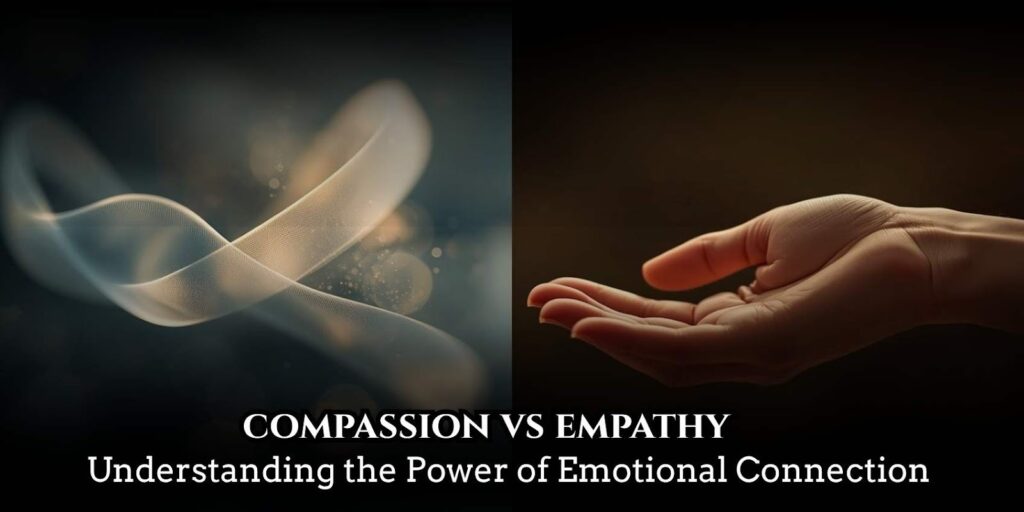In a world where human emotions guide our actions and relationships, the concept of compassion vs empathy reveals how deeply we connect with others. While empathy helps us feel another person’s emotions, compassion moves us to act and bring comfort or relief. These two powerful qualities form the foundation of emotional intelligence, nurturing healthier relationships and promoting mental well-being.
Table of Contents
This article explores their true meanings, differences, and real-life applications. You’ll learn how empathy builds understanding, how compassion inspires action, and why balancing both leads to stronger bonds and personal growth in every aspect of life.

Understanding the Essence of Compassion vs Empathy
Defining Empathy
Empathy is the emotional ability to understand and share another person’s feelings. It allows individuals to step into someone else’s emotional space, sensing their happiness, sadness, or pain. Psychologists often describe empathy as the foundation of emotional intelligence, helping people connect deeply with others. There are three main types:
- Cognitive empathy – recognizing what another person is thinking or feeling
- Emotional empathy – personally experiencing another’s emotions
- Compassionate empathy – blending emotional understanding with a genuine intention to offer help
Compassion vs empathy builds bridges of trust and connection, helping people respond with care rather than judgment.
Defining Compassion
Compassion, unlike empathy, goes beyond emotional understanding. It is the genuine desire to relieve another’s suffering. When someone feels compassion, they don’t just identify with someone’s pain they are inspired to take positive action. Compassion integrates awareness, kindness, and purpose, making it a crucial part of mental well-being and personal growth. This quality motivates people to comfort a friend, care for strangers, or engage in community service.
Historical and Psychological Background
The study of compassion vs empathy has deep historical and cultural roots. Originating from the Greek empatheia (“feeling into”) and Latin compati (“to suffer with”), these ideas have long shaped moral and emotional thought. In Buddhism, compassion (karuna) is a core virtue, while empathy guides compassionate action. Western philosophers like Aristotle and Adam Smith viewed empathy as key to ethical behavior. In modern psychology, both are vital to emotional awareness and social connection, as research shows they activate brain regions tied to morality and cooperation.
Importance in Modern Life
In Personal Relationships
Empathy helps people understand each other’s emotions, reducing conflict and fostering trust. Compassion strengthens this connection by turning emotional understanding into supportive actions. Together, they make relationships more respectful, patient, and resilient.
In Workplaces
Organizations increasingly recognize that compassion and empathy improve leadership and teamwork. Leaders who show these traits:
- Inspire loyalty among employees
- Encourage collaboration and creativity
- Reduce stress and workplace burnout
This combination of compassion vs empathy fosters an environment where employees feel genuinely heard, valued, and motivated to perform at their best.
In Society
When applied collectively, compassion vs empathy promotes social harmony by inspiring acts of kindness, charity, and mutual support. These qualities strengthen communities, build unity, and help societies overcome crises while maintaining emotional balance.
Benefits of Practicing Compassion and Empathy
- Improved Emotional Health
Practicing compassion and empathy enhances mental well-being, reduces anxiety, and increases life satisfaction. - Better Relationships
It helps people communicate effectively, resolve conflicts peacefully, and build long-term trust. - Physical Health Advantages
Research suggests compassionate individuals have lower blood pressure, stronger immunity, and better heart health. - Enhanced Emotional Intelligence
It develops self-awareness, patience, and understanding key traits for successful personal and professional life. - Positive Social Impact
When practiced consistently, compassion and empathy inspire kindness in others, creating a ripple effect of goodness across society.
These benefits make compassion vs empathy essential skills for emotional and psychological balance in the modern world.
Challenges in Practicing Compassion and Empathy
Although these traits come naturally to humans, several factors make them difficult to sustain:
- Emotional fatigue from constantly caring for others’ pain
- Cultural barriers that prevent emotional expression
- Self-centered thinking that limits understanding
- Fear of vulnerability when showing emotions openly
Overcoming the Challenges
- Practice mindfulness to stay emotionally balanced
- Engage in active listening to truly understand others
- Show self-compassion before extending care to others
- Participate in community service or volunteer programs
These methods strengthen emotional resilience and make it easier to respond with compassion vs empathy, even in challenging or emotionally demanding situations.

Real-Life Examples
- Healthcare professionals show empathy when they understand patients’ pain and compassion when they offer comfort beyond treatment.
- Teachers practice empathy by noticing students’ struggles and compassion by helping them overcome emotional or academic challenges.
- Leaders who listen to employees’ concerns and take meaningful action demonstrate the perfect balance of compassion and empathy.
- Friends and family who provide emotional support during hard times embody these traits in their purest form.
Such examples show that compassion and empathy are not just emotional concepts but practical tools for improving lives and relationships.
The Power of Compassion vs Empathy
Empathy is the root; compassion is the action that grows from it. When people blend the two, they develop deeper emotional awareness and stronger connections with others. This harmony promotes personal growth, mental peace, and societal balance. In an age of emotional disconnection, understanding compassion vs empathy reminds us that true humanity lies in caring, feeling, and acting with purpose. Practicing both daily not only enhances emotional intelligence but also creates a more peaceful, kind, and connected world.
Conclusion
In conclusion, understanding compassion vs empathy helps us connect emotionally and act meaningfully in our relationships and society. Empathy lets us feel what others experience, while compassion drives us to make a positive difference. Both qualities nurture emotional intelligence, enhance mental well-being, and strengthen social harmony. By practicing compassion and empathy daily, we build kindness that spreads naturally to others. Continue exploring these traits to improve your connections, boost personal growth, and create a more understanding and emotionally balanced world.